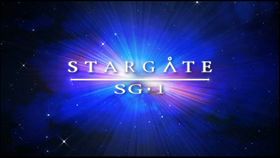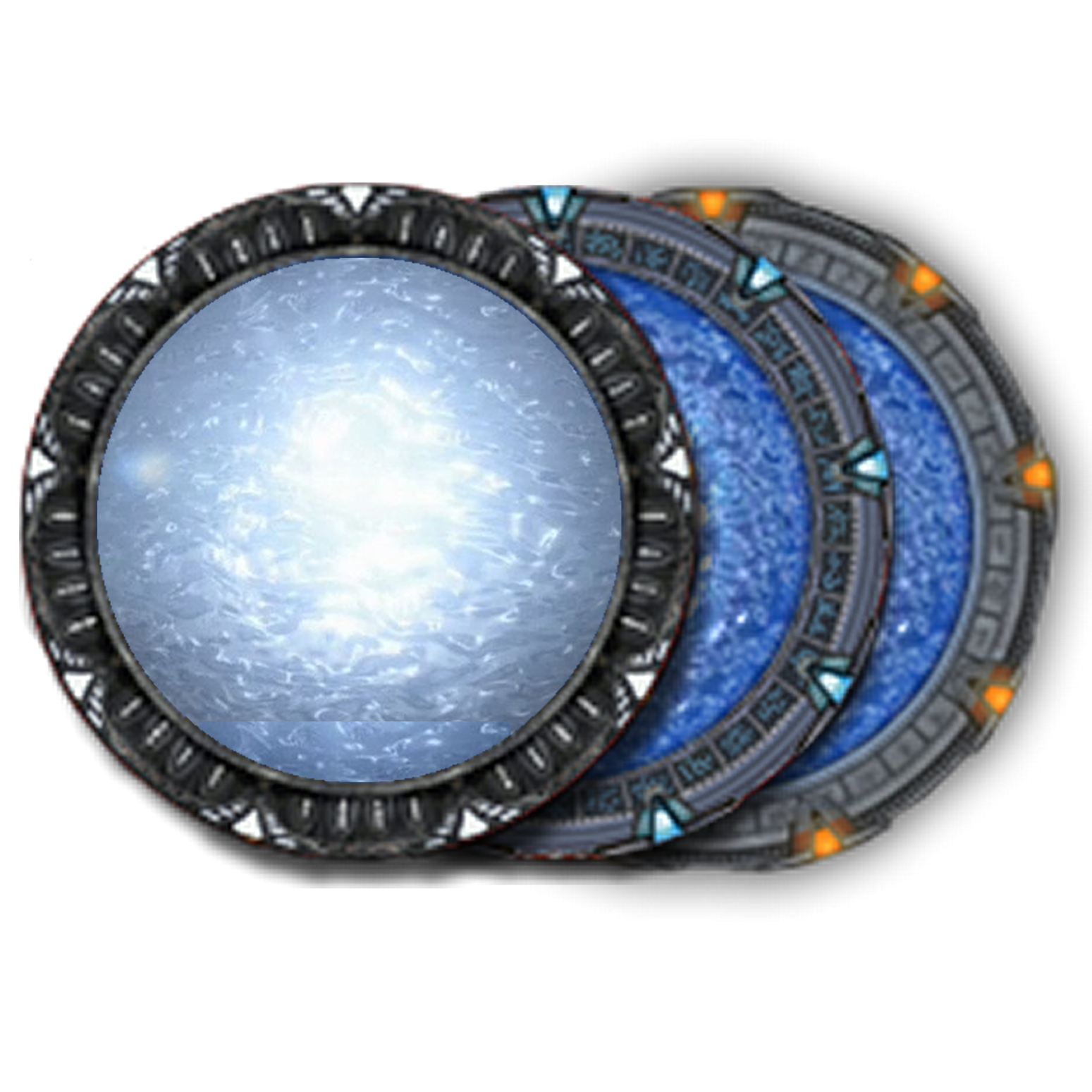Stargate SG-1
| Stargate SG-1 | |||||||
 Logo of the series (Seasons 9 and 10) | |||||||
| Genre | Military science fiction Adventure science fiction | ||||||
|---|---|---|---|---|---|---|---|
| Developed by | Brad Wright Jonathan Glassner | ||||||
| Starring | Richard Dean Anderson (1-8) Michael Shanks (1-5, 7-10) Amanda Tapping (1-10) Christopher Judge (1-10) Don S. Davis (1-7) Corin Nemec (6) Ben Browder (9, 10) Beau Bridges (9, 10) Claudia Black (10) | ||||||
| Theme music composer | Joel Goldsmith | ||||||
| Country of origin | Canada United States | ||||||
| Language(s) | English | ||||||
| No. of seasons | 10 | ||||||
| No. of episodes | 214 | ||||||
| List of episodes | |||||||
| Production | |||||||
| Executive producer(s) | Jonathan Glassner (1-3) Brad Wright (1-10) Robert C. Cooper (5-10) Joseph Mallozzi (8-10) Paul Mullie (8-10) Richard Dean Anderson (1-8) Michael Greenburgh (1-8) | ||||||
| Running time | 43 minutes | ||||||
| Production company(s) | MGM Television (1997-2007) Double Secret Productions(1997-2007) Gekko Film Corp. (1997-2005) Sony Pictures Television (2005-2006) | ||||||
| Broadcast | |||||||
| Original channel | Showtime (seasons 1-5) Sci Fi Channel (seasons 6-10) | ||||||
| Picture format | 4:3 (TV, seasons 1-7) 16:9 (TV, seasons 8-10) 16:9 (DVD) | ||||||
| Original run | July 27, 1997 – March 13, 2007 | ||||||
| Chronology | |||||||
| |||||||
| Related shows | Stargate Atlantis Stargate Universe | ||||||
| External links | |||||||
| Website | stargate.mgm.com | ||||||
Stargate SG-1 (also abbreviated as SG-1) is a Canadian-American adventure and military science fiction television series and part of Metro-Goldwyn-Mayer's Stargate franchise. The show, created by Brad Wright and Jonathan Glassner, is based on the 1994 feature film Stargate by Dean Devlin and Roland Emmerich. The television series was filmed in and around the city of Vancouver, Canada. In the United States, Showtime broadcast the first five seasons, from 1997 to 2002, and then the series moved to the Sci Fi Channel for its last five seasons, from 2002 to 2007. The final episode premiered on Sky1 in the United Kingdom on March 13, 2007, three months before its United States premiere. With ten seasons and 214 episodes, Stargate SG-1 surpassed The X-Files in 2007 as the longest-running North American science fiction series on television, before being surpassed by Smallville in 2011 with 218 episodes in ten seasons.
The story of Stargate SG-1 begins over a year after the events of the feature film, when the United States government learns that a network of ancient alien devices called Stargates connects a vast multitude of planets within our Milky Way galaxy, facilitating near-instantaneous interstellar travel. Later episodes reveal that this network is capable of spanning not just planets within the Milky Way, but with sufficient power, can provide intergalactic travel as well. Stargate SG-1 chronicles the adventures of the elite special force Air Force squad, SG-1, the flagship team of over two dozen teams from Earth who explore the galaxy and defend Earth against alien threats such as the Goa'uld, Replicators, and later the Ori. The composition of the SG-1 team is stable in the show's first five seasons but changes several times in the remaining seasons. The series expands upon many Ancient Earth mythologies such as Egyptian mythology, Norse mythology, and Arthurian legend. The 2008 direct-to-DVD films Stargate: The Ark of Truth and Stargate: Continuum continue the adventures of SG-1.
The series was a ratings success for Showtime and the Sci Fi Channel, and was particularly popular in Europe and Australia. Although it received little critical response, Stargate SG-1 was honored with numerous awards and award nominations in its ten-season run. It also spawned the animated television series Stargate Infinity[1] in 2002, the live-action spin-off TV series Stargate Atlantis in 2004, and the live-action TV series Stargate Universe in 2009 which ended in the Spring of 2011. Merchandise for Stargate SG-1 includes games and toys, print media, and an original audio series.[2]
Series overview
Stargate SG-1 resumes the plot of the original feature film and follows the present-day adventures of SG-1, a military team from Earth. SG-1 and two dozen other SG teams venture to distant planets using an alien portal known as a Stargate, which in the series is housed in a top-secret United States Air Force military base known as Stargate Command (SGC) underneath Cheyenne Mountain in Colorado Springs, Colorado. In the first eight seasons, the mission of the SG teams is to explore the galaxy and search for alien technology and allies to defend Earth against the Goa'uld, a snake-like parasitic alien race that takes humans as unwilling hosts. As explained in the series' backstory, the Goa'uld transported human slaves from Earth to other habitable planets across the galaxy thousands of years ago and now pose as gods of Ancient Earth mythologies, particularly Egyptian mythology. SG-1 eventually learns that highly evolved human-like beings, known as the Ancients, had originally built the Stargate network millions of years earlier, before they used their extraordinary powers to Ascend to a higher plane of existence, after which they pledged to not interfere in the lives of other species. The Ori, who belong to the same race of ascended beings as the Ancients but who use their powers to subjugate other species, forcing them to worship the Ori and to believe a doctrine of religious fundamentalism, assume the role of the main antagonists in seasons 9 and 10.
Goa'uld arc
The pilot episode ("Children of the Gods"), set over one year after the events of the original feature film, introduces the Goa'uld System Lord and main villain Apophis (Peter Williams) as he attacks Earth's mothballed SGC military base through the Stargate and kidnaps a soldier. The SGC is brought back into action when the Stargate is revealed to be part of an interplanetary network connecting countless planets. SG teams are created to help defend Earth against the Goa'uld, who have interstellar pyramid warships and vast armies of Jaffa (hereditary slaves and human incubators to the Goa'uld) at their disposal. Earth's flagship team SG-1, which includes Apophis's defected First Prime (lead Jaffa soldier) Teal'c, initiates several alliances with other cultures in the galaxy, such as the Goa'uld-like but truly symbiotic Tok'ra, the advanced human Tollan, the pacifist Nox, the benevolent Roswell-alien Asgard, and remnants of the powerful Ancients. Another alien threat arises in the season 3 finale ("Nemesis") in the form of sentient machines called Replicators. Meanwhile, rogue agents of a shadowy intelligence agency on Earth, the NID, repeatedly attempt to take control of the Stargate and other alien technology. Despite Apophis's death in the beginning of season 5, the Goa'uld Empire remains a major foe in Stargate SG-1 until the end of season 8. The only influential Goa'uld in the last two seasons of Stargate SG-1 is the System Lord Ba'al (Cliff Simon), who is defeated in the direct-to-DVD film Stargate: Continuum.
Anubis arc
After Apophis's defeat in the season 5 premiere ("Enemies"), the half-Ascended Goa'uld System Lord Anubis (David Palffy) becomes the main villain. He possesses much knowledge of the Ancients and their technology. While Earth builds its first interstellar spaceship (Prometheus) in seasons 6 and 7, Anubis creates an army of almost invincible Kull warriors and wipes out many of his fellow System Lords. In the season 7 finale ("Lost City"), SG-1 discovers a powerful weapon in an Ancient outpost in Antarctica that annihilates Anubis's entire fleet and also sets the stage for the spin-off series Stargate Atlantis. Ba'al subsumes much of Anubis's power in season 8, while Anubis secretly regains control of his forces. Human-form Replicators begin to conquer the System Lords, but SG-1 finds and adjusts an Ancient weapon to destroy all Replicators throughout the galaxy. Near the end of season 8 ("Threads"), it is revealed that the benevolent Ascended Being Oma Desala (Mel Harris) is responsible for Anubis's original ascension. When she engages Anubis in an eternal stalemated battle on the Ascended plane to prevent his acting on the mortal plane, the Replicators and most System Lords have already been annihilated, and the Jaffa win their freedom from Goa'uld rule.
Ori arc
The original SG-1 team disbands after the events of season 8, but slowly reunites under new team leader LtCol. Cameron Mitchell after the SGC inadvertently draws the attention of the Ancient-like Ori from another galaxy to the existence of sentient life in the Milky Way. While the Ori send enhanced human beings named Priors to the Milky Way to spread a religion that will augment the Ori's power, Ba'al and some minor Goa'uld infiltrate Earth through the Trust (a coalition of rogue NID operatives) to rebuild their power. At the end of season 9 ("Camelot"), the Ori begin an evangelistic crusade with their warships and effortlessly wipe out the combined fleet of Earth and its allies. The leader of the Ori, Adria (Morena Baccarin), is introduced in the premiere of season 10 ("Flesh and Blood"). SG-1 searches for the Sangraal, an Ancient weapon that might defeat the Ori, while Ba'al and his clones attempt to find the weapon for their own purposes. With the help of the powerful Ancient Merlin (Matthew Walker), SG-1 finds the construction plans of the Sangraal and sends a working version to the Ori galaxy. Shortly thereafter, Adria ascends. The direct-to-DVD film Stargate: The Ark of Truth ends the Ori arc.
| This page uses content from Wikipedia. The original article was at Stargate SG-1 . The list of authors can be seen in the page history. As with Semantic Stargate Wiki, the text of Wikipedia is available under the Creative Commons Attribution-ShareAlike 3.0 Unported (CC BY-SA 3.0). |
- ↑ In Semantic Stargate Wiki, Stargate Infinity is not considered as part of the Stargate canon.
- ↑ In Semantic Stargate Wiki, all merchandise (including books, games,…) is not considered as part of the Stargate canon.

